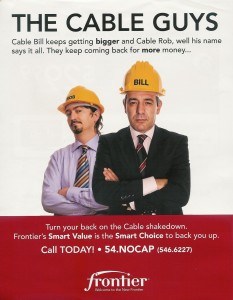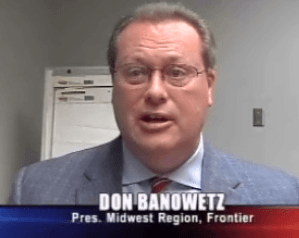 Just shy of one month after adoption, the Federal Communication Commission’s Net Neutrality rules face a legal challenge by one of the parties that helped write them.
Just shy of one month after adoption, the Federal Communication Commission’s Net Neutrality rules face a legal challenge by one of the parties that helped write them.
Verizon Communications filed suit Thursday in the same federal court that in April threw out much of the authority the FCC thought it had over online telecommunications.
“We are deeply concerned by the FCC’s assertion of broad authority for sweeping new regulation of broadband networks and the Internet itself,” said Michael E. Glover, Verizon’s senior vice president and deputy general counsel. “We believe this assertion of authority goes well beyond any authority provided by Congress, and creates uncertainty for the communications industry, innovators, investors and consumers.”
Verizon’s lead attorney in the case in Helgi Walker, who will be a familiar face in the court — Walker successfully argued the original case Comcast brought against the Commission for trying to regulate its Internet service.

FCC Chairman Julius Genachowski's cowardly cave-in on strong Net Neutrality was rewarded with... a lawsuit from Verizon to overturn the regulations the company helped write.
But Verizon wants an even greater shot at success, asking for the same panel of judges who ruled in the Comcast case to also hear its challenge.
“Verizon has made a blatant attempt to locate its challenge in a favorable appeals court forum,” said Andrew Jay Schwartzman, senior vice president and policy director of the Media Access Project.
Outgunned. Again.
The earlier decision in the Comcast case not only stripped the FCC’s authority to regulate broadband under a regulatory framework established under the Bush Administration, it derided the logic behind it. During arguments, the FCC’s general counsel acknowledged he was likely to lose the case, and actually asked the Court for guidance on how to write better rules.
Remarkably, Verizon’s legal challenge comes after the company worked closely with the Commission to moderate Net Neutrality regulations. The rules issued in December exempted wireless communications and were criticized by consumer groups for not truly representing a free and open Internet.
Rob Pegoraro, a Washington Post columnist, was incredulous the phone company was spending subscribers’ money fighting net policies that nearly mirrored the voluntary agreement it reached with Google last year.
“Okay, so you’re going to spend some of my money to fight a minimal set of regulations written to stop you from tampering with my Internet access? How is that supposed to make me feel comfortable doing business with you?
“(Note to Verizon: You are not only an enormous telecom conglomerate, you are The Phone Company. You don’t get to say “trust me.”)
“Then I got more annoyed.
“The regulations that Verizon regards as an affront to the Constitution match up closely with the proposal that Verizon published with Google in August–a suggested regulatory framework that many people, myself included, criticized for its minimal restrictions on wireless broadband services.
[…] “And not only did Verizon think that its proposed set of rules would be good for business last summer, it did so as recently as 2:25 p.m. Thursday, when a post on its public-policy blog favorably cited those suggestions.”
Nate Anderson at Ars Technica isn’t sure why Verizon is spending time fighting rules it supposedly agrees with either, and he produced a chart proving it:
Excerpted below are the main Verizon/Google provisions, followed by their matching item in the FCC’s “open Internet” order from December. All are exact quotes.
| Area |
Verizon/Google proposal |
FCC rulemaking |
| Consumer protection |
A broadband Internet access service provider would be prohibited from preventing users of its broadband Internet access service from (1) sending and receiving lawful content of their choice; (2) running lawful applications and using lawful services of their choice; and (3) connecting their choice of legal devices that do not harm the network or service, facilitate theft of service, or harm other users of the service. |
A person engaged in the provision of fixed broadband Internet access service, insofar as such person is so engaged, shall not block lawful content, applications, services, or non-harmful devices, subject to reasonable network management. |
| Non-discrimination |
In providing broadband Internet access service, a provider would be prohibited from engaging in undue discrimination against any lawful Internet content, application, or service in a manner that causes meaningful harm to competition or to users. |
A person engaged in the provision of fixed broadband Internet access service, insofar as such person is so engaged, shall not unreasonably discriminate in transmitting lawful network traffic over a consumer’s broadband Internet access service. |
| Transparency |
Providers of broadband Internet access service would be required to disclose accurate and relevant information in plain language about the characteristics and capabilities of their offerings, their broadband network management, and other practices necessary for consumers and other users to make informed choices. |
A person engaged in the provision of broadband Internet access service shall publicly disclose accurate information regarding the network management practices, performance, and commercial terms of its broadband Internet access services sufficient for consumers to make informed choices regarding use of such services and for content, application, service, and device providers to develop, market, and maintain Internet offerings. |
| Reasonable network management |
Broadband Internet access service providers are permitted to engage in reasonable network management. |
Reasonable network management shall not constitute unreasonable discrimination. |
| Specialized (or “managed”) services |
A provider that offers a broadband Internet access service complying with the above principles could offer any other additional or differentiated services. Such other services would have to be distinguishable in scope and purpose from broadband Internet access service, but could make use of or access Internet content, applications or services and could include traffic prioritization. The FCC would publish an annual report on the effect of these additional services, and immediately report if it finds at any time that these services threaten the meaningful availability of broadband Internet access services or have been devised or promoted in a manner designed to evade these consumer protections. |
We recognize that broadband providers may offer other services over the same last-mile connections used to provide broadband service. These “specialized services” can benefit end users and spur investment, but they may also present risks to the open Internet. We will closely monitor specialized services and their effects on broadband service to ensure, through all available mechanisms, that they supplement but do not supplant the open Internet. |
| Wireless |
Because of the unique technical and operational characteristics of wireless networks, and the competitive and still-developing nature of wireless broadband services, only the transparency principle would apply to wireless broadband at this time. The U.S. Government Accountability Office would report to Congress annually on the continued development and robustness of wireless broadband Internet access services. |
Mobile broadband is at an earlier stage in its development than fixed broadband and is evolving rapidly. For that and other reasons discussed below, we conclude that it is appropriate at this time to take measured steps in this area. Accordingly, we require mobile broadband providers to comply with the transparency rule, which includes enforceable disclosure obligations regarding device and application certification and approval processes; we prohibit providers from blocking lawful websites; and we prohibit providers from blocking applications that compete with providers’ voice and video telephony services. We will closely monitor the development of the mobile broadband market and will adjust the framework we adopt today as appropriate. |
Despite the perceived rush to court, legal challenges against the FCC’s Net Neutrality rules were widely expected. The FCC continues to tell the press (on background), it believes it has the authority to enact Internet-related regulations and policies. But many court watchers familiar with the District of Columbia Court of Appeals think it is more likely than not Verizon will prevail on similar legal arguments Comcast used to win its case.
What then?
Pegoraro: “I’d like to think that it would be fitting if the FCC responded by returning to the regulatory strategy it should have adopted in the first place: putting broadband Internet services back under a simplified form of the “Title II” common-carrier regulation that most operated under until 2005.”
“But if the FCC couldn’t find the gumption to choose that more aggressive but more legally grounded option before, why would it now?”
 A Montreal blogger experienced the wrath of some Videotron employees when he casually snapped a photo of their recently-remodeled store in the Carrefour Agrignon.
A Montreal blogger experienced the wrath of some Videotron employees when he casually snapped a photo of their recently-remodeled store in the Carrefour Agrignon.

 Subscribe
Subscribe







